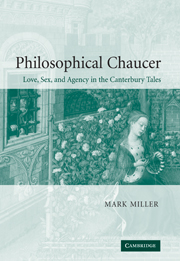Book contents
- Frontmatter
- Contents
- Acknowledgments
- Introduction: Chaucer and the problem of normativity
- Chapter 1 Naturalism and its discontents in the Miller's Tale
- Chapter 2 Normative longing in the Knight's Tale
- Chapter 3 Agency and dialectic in the Consolation of Philosophy
- Chapter 4 Sadomasochism and utopia in the Roman de la Rose
- Chapter 5 Suffering love in the Wife of Bath's Prologue and Tale
- Chapter 6 Love's promise: the Clerk's Tale and the scandal of the unconditional
- Notes
- Bibliography
- Index
Introduction: Chaucer and the problem of normativity
Published online by Cambridge University Press: 22 September 2009
- Frontmatter
- Contents
- Acknowledgments
- Introduction: Chaucer and the problem of normativity
- Chapter 1 Naturalism and its discontents in the Miller's Tale
- Chapter 2 Normative longing in the Knight's Tale
- Chapter 3 Agency and dialectic in the Consolation of Philosophy
- Chapter 4 Sadomasochism and utopia in the Roman de la Rose
- Chapter 5 Suffering love in the Wife of Bath's Prologue and Tale
- Chapter 6 Love's promise: the Clerk's Tale and the scandal of the unconditional
- Notes
- Bibliography
- Index
Summary
This book refines and redirects two views of Chaucer that have dominated the reception of his writing since his lifetime: that he was a philosophical poet and that he was a poet of love. I argue that the Canterbury Tales represents an extended meditation on agency, autonomy, and practical reason, and that this philosophical aspect of Chaucer's interests can help us understand what is both sophisticated and disturbing about his explorations of love, sex, and gender. In pursuing this argument about Chaucer, the book opens onto a broader discussion of the long-standing association in the Christian West between problems of autonomy and problems of sexuality, and the premodern intellectual and literary resources for understanding psychological phenomena often associated with psychoanalysis, such as repression, fetishism, narcissism, sadism, and masochism. And in discussing both Chaucer's literary experiments and the philosophical methods and psychological concepts informing them, Philosophical Chaucer develops a still broader theoretical argument concerning normativity and its relations to ideology and practical reason. This introduction will sketch the landscape of these arguments to indicate why they belong together in a single book.
The idea of Chaucer as a philosophical love poet has traditionally centered on his career as a courtly writer steeped in the Latin, French, and Italian traditions of psychological and philosophical allegory and erotic lyricism, a career that mostly predates the Canterbury Tales and whose crowning achievement was Troilus and Criseyde.
- Type
- Chapter
- Information
- Philosophical ChaucerLove, Sex, and Agency in the Canterbury Tales, pp. 1 - 35Publisher: Cambridge University PressPrint publication year: 2005

